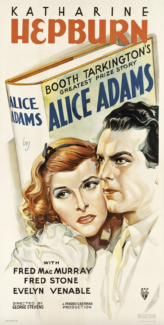Alice Adams (George Stevens, 1935): U.S. A.
Reviewed by Larry Gleeson during the annual TCM 31 Days of Oscar
 Alice Adams (1935), a dramatic romantic comedy, directed by George Stevens, was nominated for two Oscars, Best Picture, and Best Actress in a Leading Role for Catherine Hepburn’s work as Alice Adams. The film helped establish Stevens as a formidable director and stabilized Hepburn career after several box office flops. As Alice Adams, Hepburn is lively, animated, and delivers her lines with physicality and with credibility.
Alice Adams (1935), a dramatic romantic comedy, directed by George Stevens, was nominated for two Oscars, Best Picture, and Best Actress in a Leading Role for Catherine Hepburn’s work as Alice Adams. The film helped establish Stevens as a formidable director and stabilized Hepburn career after several box office flops. As Alice Adams, Hepburn is lively, animated, and delivers her lines with physicality and with credibility.
The film features several other solid performances. Fred Stone (Virgil Adams) has a self-deprecating manner along the lines of W.C. Fields – only Stone stays primarily within the dramatic. A twenty-seven-year-old, Fred MacMurray (Double Indemnity), plays a dashing young suitor, Arthur Russell. Hattie McDaniel (Melana), who would go on to become the first African American nominated and win an Oscar, provides a solid presence in the Adams household, especially when Arthur comes calling.
With Arthur in the house, and with the Adams family attempting to ensure the dinner is up to par for a social engagement, on what is a blistering evening, the subtle humor begins to ramp up. Mrs. Adams engaging in polite conversation as Virgil is finishing dressing. Alice is frantic moving from one worrying detail to the next. First sewing up her father’s formal dress shirt that doesn’t button up. Then, ensuring they use the stairs to make an entry into their own living room.
The dinner scene has some high moments of comedy where seemingly everything goes haywire. Without much of a word, dinner has ended. Alice and Russell share a moment outside on the porch. Alice, beside herself, bids Russell farewell feeling the aftereffects of the dinner. Russell politely tells Alice it’s just a good night, not the end of their relationship.
Ann Shoemaker (Mrs. Adams) is a watchful mother, seeking a better life for Alice – usually in the form of pushing Virgil to do more to provide for Alice. Alice wears nice-looking dresses from two years ago, an eternity in the fashion world, and picks flowers for a corsage from a municipal park. Alice never really complains. Instead, she users her imagination and her fluency in French to put forth an aura of sophistication and intelligence – she is both.
Eventually, Virgil moves forward in business. Mr. Lamb is a sharp, successful businessman and despite Mr. Lamb paying Virgil while he is recuperating, Virgil takes the glue formula he and another employee, now deceased, created while under the employ of Mr. Lamb. Virgil goes all in putting every penny into the glue works business venture. When a troubling situation arises involving Virgil’s son, Walter (Frank Albertson), Virgil is at wits end. Walter is a standup young man, and Virgil doesn’t want him to end up in the penitentiary.
Made in the fully enforced Production Code, Depression-era of 1935, Alice Adams, subtly deals with the economic shortfalls and the social issues prevalent in small-town America. The cinematography, by Robert De Grasse, delivers insight into the intricacies of relationship dynamics. The costuming and makeup reveal distinct social stature. But it’s the well-designed mise-en-scen that informs the most.
Primarily a character-driven narrative, based on Booth Tarkington’s Pulitzer Prize winning 1921 novel, Alice Adams, the film manages to wrest the sentiment of a young girl who desires to climb the social ladder. Stevens gets Hepburn to emanate the interior feelings of Alice as she competes with her cross-town rival, Mildred Palmer, a society girl who has her eyes on Arthur. But when Lamb builds a glue factory in a large building across the street from Virgil’s glue works, the Adams family finds itself on the brink.
What transpires is heartwarming as the Adams family rallies around Walter’s trouble. Mr. Lamb and Virgil reconcile, and Alice finds love despite, or possibly due to, the idiosyncrasies of her imagination and curiosity-seeking behavior. With a runtime of one hour and thirty-nine minutes, Alice Adams is charming and delightful. Highly recommended.
About this entry
You’re currently reading “Alice Adams (George Stevens, 1935): U.S. A.,” an entry on Student Film Reviews
- Published:
- 02.16.25 / 2pm
- Category:
- Films
No comments
Jump to comment form | comments rss [?]